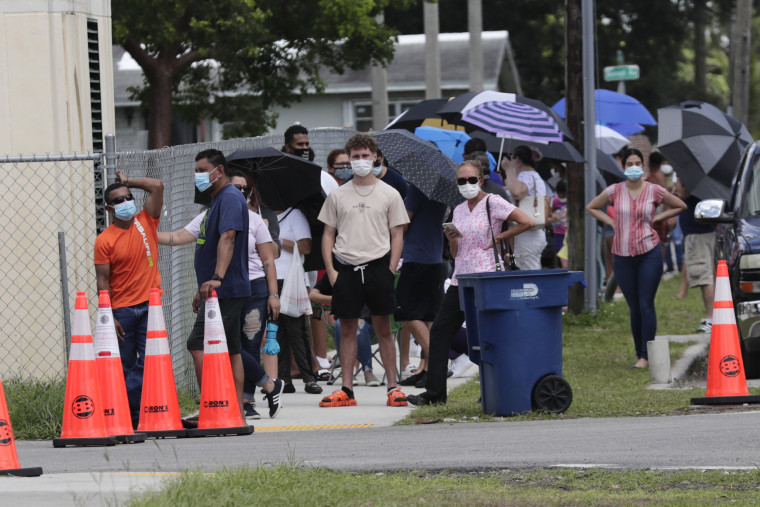MIAMI — For Jorge Jaen, the wait time for lab results to confirm he was infected with COVID-19 was only three days. He attributes it to knowing the owner of the private lab company he went to.
“I deteriorated very quickly. It was day and night. I went from breathing normal to having shortness of breath very quickly,” said Jaen, a 50-year-old real estate agent.
Now, hospitalized at a small Miami-area hospital with pneumonia and waiting for convalescent plasma that is in short supply, he worries if he could have infected a relative he lives with who is immunocompromised. She is now waiting for test results that could take over a week in Florida right now.
As demand for COVID-19 tests continues to rise in hard-hit Florida, so do the wait times for test results. Results can take 7 to 10 days and in some cases, even more. Nationwide, more people are testing for the virus and the turnaround time for results has increased from a couple of days to at least a week.
Outbreaks throughout the Sun Belt have strained labs and some are struggling to provide results in five to seven days. Demand in testing has caused shortages in swabs, chemical reagents, and equipment.
Florida, one of the worst hit states in the country right now had a record number of hospitalizations Tuesday. Hospitals took in an additional 517 patients since Monday. The death count was recorded at 134 and the state reported 9,440 new cases. The positivity rate among new cases in the state is now over 13 percent, though in Miami-Dade County it’s averaging about 20 percent.
"An equation for disaster"
Health experts say getting test results quickly is crucial since people are contagious during the first few days with the virus, even before showing symptoms. It’s an important time for people to stay home or isolate. If they continue with their lives while they wait for test results then they could be spreading the virus to others.
Longer turnaround times can also make contact tracing more difficult since it relies on finding people within a short window of time.
“The turnaround time is very important,” said Dr. Eneida Roldan, professor and CEO of Florida International University’s Health Care Network.
She believes the delays are part of the reason there is more expanded community transmission because there is a lack of understanding that when you test you have to quarantine until your results are back.
Because some counties and cities in Florida have not mandated face masks in public, there is huge challenge with those populations not following public health measures.
“When you put all that together you have an equation for disaster,” said Roldan. By the time “a contact tracer comes in, it’s extremely difficult to know who you have been in contact with.”
Gov. Ron DeSantis said last week the state would “shift business away” from testing labs that aren’t able to comply with close to a 48-hour turnaround time.
"Those who can produce are going to get more of the business, and I think that's the best way to go about it," DeSantis, a Republican, said during the briefing.
The state has agreements with 16 labs to provide testing for state-supported testing sites. The Health Department did not respond to an email inquiring about whether this process has begun to take place.
In a posted statement, Quest Diagnostics, one of the largest laboratory companies in the country, said that demand for COVID-19 molecular testing continues to outpace their capacity and is highest in the South, Southwest and West regions of the country.
“However, the inflow of specimens to our labs has stabilized, at a high level, compared to last week, due to our efforts to modulate orders for lower risk patients.”
Last week the U.S. Food and Drug Administration granted emergency use authorization for pooling specimen samples from up to four individuals.
In order to accelerate turnaround time in key neighborhoods, Roldan suggested local laboratories could deploy mobile labs to hot zones.
Two weeks ago, Ines Peña, 78, lined up outside the Miami Beach Convention Center, one of the community testing sites, after she was exposed to the coronavirus.
After the nose swab, she isolated in her South Beach apartment for fear of potentially spreading the virus to others, if she indeed had it.
Eight days later, with no word on the results, she called a phone number that had been provided to her and found out the test was negative. The following day, she received the official call saying her results were in.
But the eight-day wait was nerve racking for Peña.
“I was anxious,” she said. “The worrying made me feel symptoms. I had to take Tylenol for headaches.”
Follow NBC Latino on Facebook, Twitter and Instagram.



